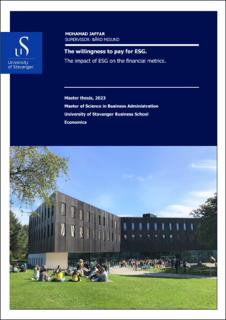| dc.description.abstract | To what extent are investors and companies in the Nordic countries inclined to invest in
environmental, social, and corporate governance (ESG) practices and consider other related
factors? This paper examines the economic effect of ESG factors on the financial metrics of
343 Nordic companies over the period 2013-2022. The ESG ratings were obtained from the
Thomson Reuters Refinitiv (2023) database, and Ordinary Least Squares (OLS) regression
analysis was used to assess the relationship between ESG factors and financial metrics such
as return on equity (ROE), weighted average cost of capital (WACC), Beta, and price-book-value P/B. The findings suggest that the overall ESG combined rating does not exhibit a
significant relationship with these financial metrics. The findings emphasize the intricate
nature of the relationship between ESG factors and financial performance. Although ESG
factors do not have a strong impact on ROE and P/B, they do exhibit significant relationships
with Beta and WACC. This suggests that ESG considerations may play a more prominent
role in determining a company's risk profile and cost of capital, compared to their direct
impact on profitability and valuation metrics. However, the analysis reveals mixed results
regarding the influence of specific ESG factors. Human rights have a positive effect on ROE
and P/B, while CSR has a negative effect on both. This suggests that different ESG factors
can have contrasting effects on financial performance. Variables related to environment,
social, human rights, and innovation show no significant association with financial metrics.
Workforce and CSR have a negative impact on WACC, indicating potential cost savings for
companies prioritizing these factors, whereas governance has a positive impact on WACC,
reflecting higher return expectations for firms with strong governance practices. | |
